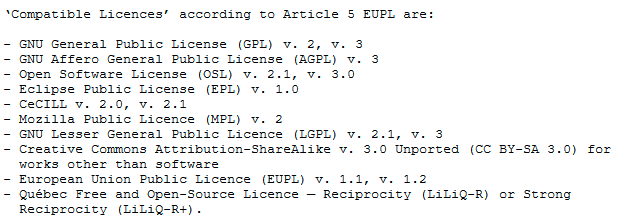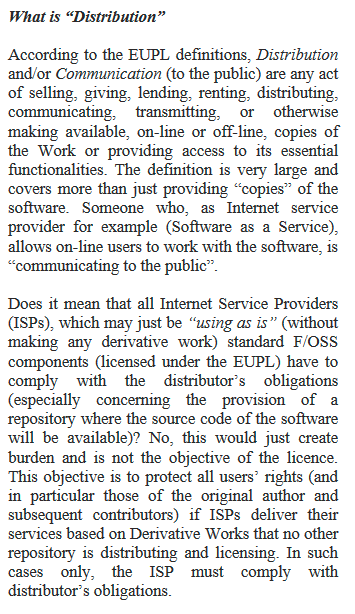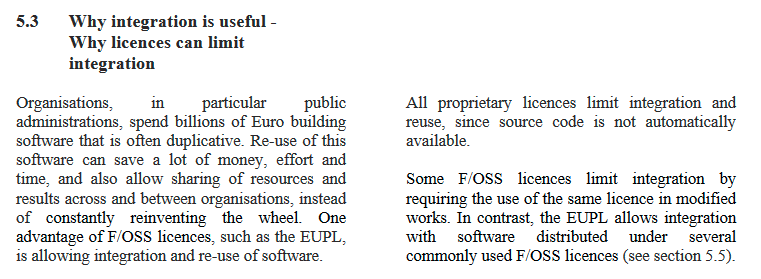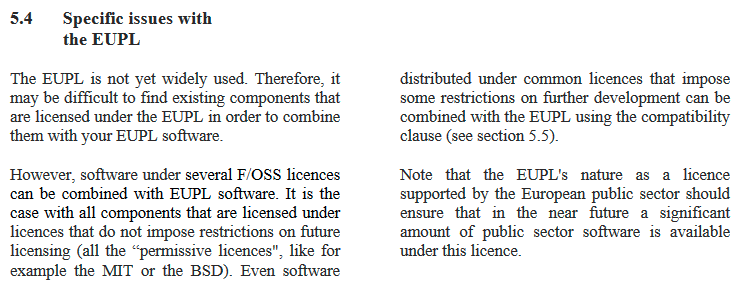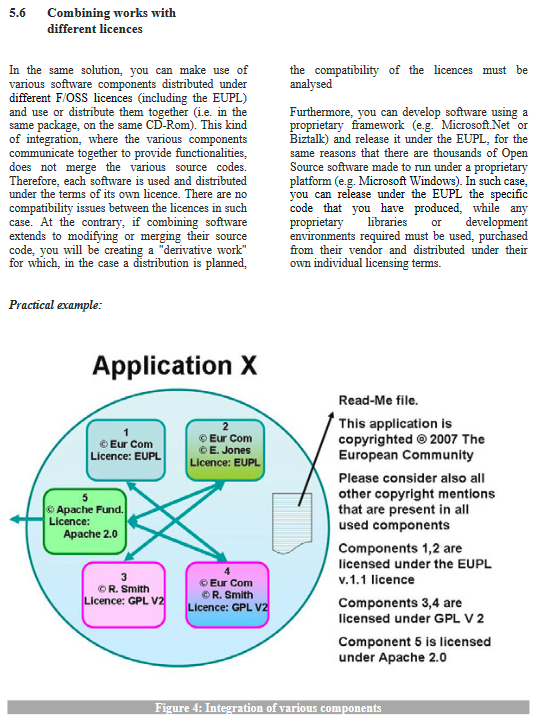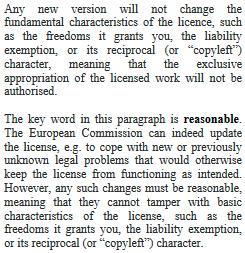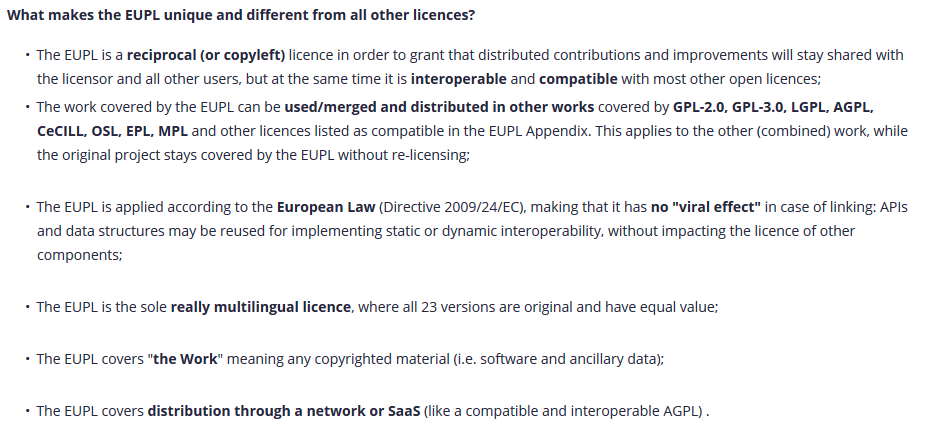TIL: There's EUPL, a GPL-compatible official EU Free Software license intended mainly for use by public European bodies. It has official translations to all 23 EU languages.
https://en.wikipedia.org/wiki/European_Union_Public_Licence
I'm going to read/skim through it now. A thread.
https://en.wikipedia.org/wiki/European_Union_Public_Licence
I'm going to read/skim through it now. A thread.
1/ Right off the bat we're into interesting stuff. Presumably because people are TERRIBLE in applying licenses correctly there's a bit of fudge-room in how one is supposed to mark a work as being under this license.
2/ Definitions sections carefully declines from defining what a derivative work is. Not sure what I think about that.
3/ Scope of Rights section takes Moral Rights into account, which are generally absent from Anglo-Saxon license frameworks:
4/ Scope of Rights also includes some explicit language useful when applying the license to non-software artifacts, like performance rights.
5/ Communication of source code section - me LIKE. "Stick a link to a github fork under the license when distributing an executable and you're good to go, as long as that repo is around as long as you distribute this".
6/ Limitations on copyright: nothing special here. Just simpleish "Licensee has all the rights" language as far as I can tell.
7/ Obligations of the licensee. Most interesting part is the compatibility clause, which says that distributing a combined work under a compatible license is OK, and says that there is a specific list of compatible licenses. I think this is a pretty neat and practical take.
8/ Chain of authorship. I don't remember if this is commonplace, but I like it. If I understand it correct it says that "if you touch this work you warrant that you have the right to place your work under it", presumably to avoid any work-for-hire messiness later.
9/ Disclaimer of warranty. On one hand, this is a standard section, on the other hand I love the language here. If you just read one of my screencaps make it this one.
10/ Disclaimer of liability. Standard stuff, I think.
11/ Additional agreements. If I read this correctly, it's: "If you provide this work to someone and make extra promises, you can, but only if you also promise to shield original contributors from trouble." Outside my mental models, not sure what the scenario is.
12/ Acceptance of license. Explicit mention of click-through acceptance, not sure how I feel about that. Still, also clarifies that exercising any right granted by the license also clearly constitutes acceptance. Nothing really noteworthy here, I think.
13/ Information to the public. I HATE this, unless I misunderstand it. "If you provide a download of the work you need to obey the law about what information you need to provide." This seems like a no-op clause that doesn't provide any clarity or guidance. Blerg.
14/ Termination of the license. Nothing special. "If you breach this agreement you lose rights granted by it, but this doesn't impact anyone else."
15/ Miscellaneous. This bit is INTERESTING. First there's a "this is the whole agreement, except of course there might be additional agreements as per section 9". Nothing too special about that, I guess.
16/ Miscellaneous cont. "If some part is problematic in eyes of law, disregard and interpret as close to spirit as possible", pretty standard contract language.
17/ Miscellaneous cont. Now comes the interesting part. All 23 linguistic versions have equal validity, and if there's a difference you can take your pick.
This is AFAICT a direct consequence of EU language directives.
Massive props beans for linguistic accessibility.
This is AFAICT a direct consequence of EU language directives.
Massive props beans for linguistic accessibility.
18/ Jurisdiction. "If EU bodies fight over this license, they shall do it in <this specific court>, if anyone else fights it is in the home court of the licensor."
Nice for that to be explicit. The EU body battleground bit slightly amuses me, though.
Nice for that to be explicit. The EU body battleground bit slightly amuses me, though.
19/ Applicable law. "Laws of the EU home country of the licensor apply, or if the licensor is not European then Belgian laws govern this license." Not sure what to make out of it.
Probably makes it unlikely for non-Europeans to ever use this, but provides clarity if they do.
Probably makes it unlikely for non-Europeans to ever use this, but provides clarity if they do.
20/ Appendix. The list of compatible license is there. I really like this. No need to wonder if a license is compatible or not.
21/ My thoughts. I think this a very readable license. Anyone who accuses EU of producing only unreadable gibberish is clearly wrong.
This is more in the spirit of GPLv2 than v3, which I like, even though it is explicitly compatible with both.
This is more in the spirit of GPLv2 than v3, which I like, even though it is explicitly compatible with both.
22/ My thoughts cont. I also _really_ enjoyed reading a license that clearly comes from European jurisprudence instead of American.
Overall it seems like a modern GPLv2 with some specific niceties in language.
+1 worth considering if you're considering a GPL-style license.
Overall it seems like a modern GPLv2 with some specific niceties in language.
+1 worth considering if you're considering a GPL-style license.
23/ My thoughts cont. Next I'm going to take a quick look at the Finnish version. I've NEVER read an open source license in Finnish so that's going to be a trip. Very curious to see how "Copyleft" is translated...
24/ Never knew "Derivative Work" in Finnish is "Jälkiperäisteos". It's on interesting translation, no idea if novel or established. Not obvious outside the context for sure, it's in the definitions section so plenty of context here. :)
25/ Oh, a bit I overlooked in the English text: there's an explicit grant of patents required to utilize the work.
26/ (Good that they covered that.)
27/ Huh, so "Attribution right" is "Isyysoikeus" in Finnish. Definitely didn't know that. Again, no idea if this is novel or standard. Literal translation back to English would be "Paternal right".
Copyleft is left untranslated, so "Copyleft-clause" is "Copyleft-lauseke". Pity!
Copyleft is left untranslated, so "Copyleft-clause" is "Copyleft-lauseke". Pity!
28/ I was really hoping to see some linguistic innovation there. You see, the Finnish word for copyright translates literally as "author's right", and while "right" as direction and permission are two different words in Finnish, they are VERY close. (Oikea vs oikeus.)
29/ There would definitely have been an opportunity for cleverness there, but I guess not taking it is a sign that all the translations I'm unfamiliar with it are probably established ones.
30/ No further comments on the Finnish text. Since they're explicitly equally valid guess calling it a translation is maybe not technically correct - even though Finnish for sure wasn't the original language this was written in.
This concludes the thread, hope you enjoyed it!
This concludes the thread, hope you enjoyed it!
31/ I lied! I forgot the official site of the license, let's take a look at that... https://joinup.ec.europa.eu/collection/eupl/eupl-guidelines-faq-infographics
32/ Ok, so there's the text in all linguistic versions of course. Then we have guidelines for users and developers, in 23 languages as well.
Let's see. Starts with a disclaimer. "Opinions of authors, not official."
Let's see. Starts with a disclaimer. "Opinions of authors, not official."
33/ "Who are these guidelines for". Blah-blah, skipping.
34/ "Using software under EUPL". This starts of by explaining how Open Source and Free Software licenses generally work, ie. the legal principles behind them.
35/ Continues by explaining the OSI principles.
36/ "Using EUPL-licenced code: your rights and obligations"
Good explanations of what things mean, with examples. See eg.
Good explanations of what things mean, with examples. See eg.
39/ Releasing your own software under the EUPL.
- Make sure you actually own the thing first!
- F/OSS principles, community building.
- Why is a license important.
- Decision to license.
- Decision to use EUPL.
(cont)
- Make sure you actually own the thing first!
- F/OSS principles, community building.
- Why is a license important.
- Decision to license.
- Decision to use EUPL.
(cont)
40/ Releasing your own software under the EUPL (cont)
- How to actually do the licensing bit, incl. best practices.
- No need to register your users.
- Repository
- How to communicate.
Not everyone has any F/OSS background, this does a good job of telling what's what.
- How to actually do the licensing bit, incl. best practices.
- No need to register your users.
- Repository
- How to communicate.
Not everyone has any F/OSS background, this does a good job of telling what's what.
41/ Developing or integrating SW under EUPL.
- F/OSS development principles: modularity, version control, documentation. (Ha!)
- On importance of integration (see picture). This is a bit that should IMO be front and center, not on page 20.
- F/OSS development principles: modularity, version control, documentation. (Ha!)
- On importance of integration (see picture). This is a bit that should IMO be front and center, not on page 20.
42/ Developing or integrating SW under EUPL (cont)
- Specific Issues With EUPL. I *so* wish more bodies with their own licenses included a section like this in their materials. This one is a bit skimpy, though. Just says "EUPL is not well known, but plays well with others."
- Specific Issues With EUPL. I *so* wish more bodies with their own licenses included a section like this in their materials. This one is a bit skimpy, though. Just says "EUPL is not well known, but plays well with others."
43/ Developing or integrating SW under EUPL (cont)
- Compatibility. "We've got it in oodles, doncha worry."
- Combining with different licenses. "If you don't <merge the codes> you don't need to combine licenses." That term... but good explanation.
- Compatibility. "We've got it in oodles, doncha worry."
- Combining with different licenses. "If you don't <merge the codes> you don't need to combine licenses." That term... but good explanation.
44/ New versions. "New versions of the license automatically apply unless you say they don't. This is a good thing."
/45 Conclusions. "There needs to be a conclusions section, this is not quite lorem ipsum, but yeah."
46/ Ok, let's see what else is on the license site.
"Why EUPL" - that seems interesting.
"Why EUPL" - that seems interesting.
47/ Unique:
- Copyleft but interoperable
- Low virality: APIs and data structures can be used without contamination.
- Multilingual.
- Covers any copyrighted work (assets, etc), not just SW.
- Covers network distribution and SaaS.
This is a really good summary!
- Copyleft but interoperable
- Low virality: APIs and data structures can be used without contamination.
- Multilingual.
- Covers any copyrighted work (assets, etc), not just SW.
- Covers network distribution and SaaS.
This is a really good summary!
48/ OMG! There's a License Wizard to help you choose the right one!
This is brilliant. https://joinup.ec.europa.eu/collection/eupl/licence-wizard
This is brilliant. https://joinup.ec.europa.eu/collection/eupl/licence-wizard
49/ There's also a FAQ answering questions like: "Does EUPL deprive me from intellectual property?" which actually covers things like dual licensing.
This is a good FAQ. https://joinup.ec.europa.eu/collection/eupl/how-use-eupl
This is a good FAQ. https://joinup.ec.europa.eu/collection/eupl/how-use-eupl
50/ I think this is brilliant, all of this.
There's lately been talk about death of FOSS, co-option of open source labor by corporations, etc.
I think this demonstrates another trend: FOSS by public bodies.
There's lately been talk about death of FOSS, co-option of open source labor by corporations, etc.
I think this demonstrates another trend: FOSS by public bodies.
51/ I confess I've long been a MIT-license aficionado, just because I consider *my* open source efforts a gift. If someone makes money out of them, fine.
Still, I might actually use EUPL in the future. This is really good stuff.
Still, I might actually use EUPL in the future. This is really good stuff.
52/ Just like a deck of playing cards, even this tweetstorm must end.
Again, hope you enjoyed this spontaneous dive into a TIL thing.
Again, hope you enjoyed this spontaneous dive into a TIL thing.

 Read on Twitter
Read on Twitter













